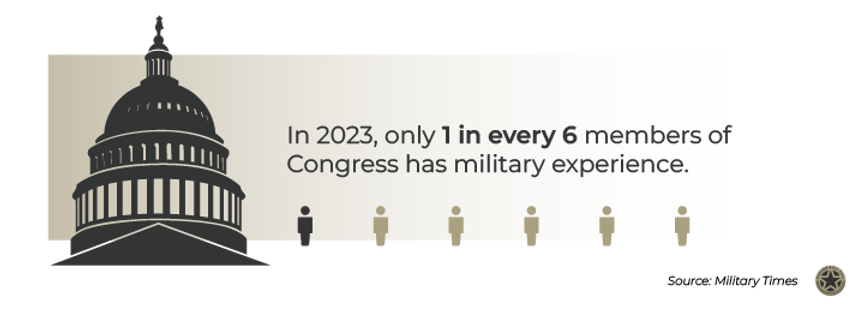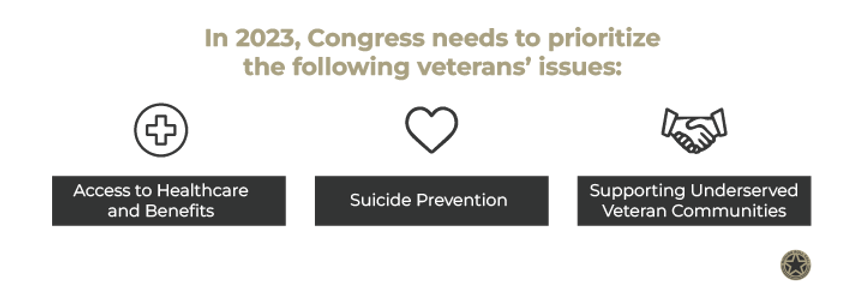Veteran Policies and Issues the New Congress Should Prioritize in 2023

The 118th Congress took office in January, and there are several timely issues on the table for our nation’s leaders. Although there is some veteran representation among the members, it is still crucial to keep veteran-related policies and issues on their radar. Specifically, the new Congress should prioritize effective veteran suicide prevention initiatives, improved access to healthcare and benefits, and greater support for underserved veterans.
Mission Roll Call is ready to further our bipartisan advocacy around these objectives as our nation’s new lawmakers set an agenda. In detailing the policies, issues, and legislation Congress should prioritize in 2023, this article will cover the following topics:
- How many veterans are in Congress in 2023?
- What veterans issues and bills are on the table for Congress in 2023?
- What veterans policies, legislation, and issues should Congress prioritize in 2023?
- How does Mission Roll Call plan to further advocate for veterans issues in 2023?
How many veterans are in Congress in 2023?
The new Congress has 80 U.S. House of Representative members who have served in the military, reflecting 18.4% of the total congressional membership and up from 75 (17.2%) in the previous House, according to the Pew Research Center. In the Senate, there are still 17 members who are veterans.
Whenever election seasons ramp up, the hope is to elect a Congress that is diverse and, most of all, dedicated to serving the needs of our nation’s citizens. Veterans are particularly deserving of this commitment, as they’ve exhibited immeasurable duty and sacrifice for our country.
The number of veterans in Congress has decreased over the last few decades, declining almost steadily since the mid-1970s when the military began shifting from a pool of drafted individuals to an all-volunteer force. For example, in 1973, around three of every four Congress members had military experience. In 2023, that number has dropped to about one of every six members. The new House has one of the smallest percentages of veterans in recent times (though more than the outgoing body).

The Army, including the Army Reserve and the Army National Guard, is the best-represented branch of the military; over 40% of all the veterans in the House (36 of 80) have served in the Army, the Reserve, or the National Guard.
Another distinction for the new Congress is that women now make up more than a quarter (28%) of Congress — the highest percentage in U.S. history and a significant increase from even just a decade ago. Also, Native American representation is in line with the national demographic; Native Americans are 1% of the overall population and now make up 1% of Congress members.
The makeup of Congress would suggest a greater focus on the issues impacting the demographics represented, but political pressures and agendas can easily take priority. It’s important to stay aware of congressional activities so that we are all empowered to hold lawmakers accountable for addressing the needs of the American public.
For veterans affairs in particular, there are several matters around suicide prevention and healthcare and benefits access that should be at the forefront of our leaders’ agenda. Our August 2022 research survey found the majority of Americans believe the federal government has not been effective in addressing veteran suicide (53%) or assisting veterans in transitioning to civilian life (47%), and 86% believe Congress should provide quality and expedient healthcare for veterans.
Recognizing the gaps in veteran support, we can collectively work to foster greater awareness and political action around veterans issues in 2023.
What veterans issues and bills are on the table for Congress in 2023?
Welcoming a new year and Congress should remind us that suicide prevention, mental health support, and access to benefits are still issues that demand attention from lawmakers. In 2022, we saw progress on several pertinent veterans issues. This included the passing of the Honoring Our PACT Act, meant to assist veterans who have been exposed to toxic chemicals from burn pits and other sources; the Solid Start Act, requiring the Department of Veterans Affairs (VA) to contact veterans within their first year out of the military; and the MAMMO Act, focused on improving breast health services at VA facilities.
The VA expanded benefits eligibility to over 3.5 million veterans after the PACT Act passed in August 2022 and also launched a mobile application called VA: Health and Benefits. The downloadable app is aimed at centralizing veterans’ health and benefits information and streamlining navigation of VA services.

More recently, the Biden administration announced that starting in mid-January, veterans in suicidal crisis can receive free emergency medical care at any VA or private care facility. Unlike for most other medical benefits, former service members don’t have to be enrolled in the VA system to be eligible, meaning the new policy could impact over 18 million veterans.
The AUTO Act was also signed into law in early January 2023, allowing disabled veterans who need modified vehicles to receive a grant from the VA every 10 years rather than once in a lifetime; and the VA announced that it will begin waiving all copays for eligible American Indian and Alaska Native veterans, to encourage greater use of primary-care medicine among underserved veteran populations.
Even with these commendable steps taken in 2022 and early this year, there are many policy changes for Congress to consider.
Veterans bills pending in Congress in 2023 include:
- American Indian and Alaska Native Veterans Mental Health Act: This legislation would direct the Secretary of Veterans Affairs to improve suicide prevention and mental health outreach to American Indians and Alaska Natives, as well as to other minority veterans groups.
- Vet CENTERS for Mental Health Act of 2021: This bill is aimed at increasing the number of Vet Centers in various states based on population data. Looking toward better serving the mental healthcare needs of veterans, it would require the VA to ensure certain states establish at least one additional center, and open community-based outpatient clinics.
- Department of Veteran Affairs Provider Accountability Act: This act would amend Title 38 and mandate that the Secretary of Veterans Affairs enforce licensure and professional requirements for health care providers servicing veterans.
- The GUARD Act: Cracking down on lawyer fees for navigating veterans’ benefits claims, this bill would impose criminal penalties on individuals who directly or indirectly solicit, charge for, or receive unauthorized fees or compensation preparing such claims. These offenses could also be punishable by imprisonment.
What veterans policies, legislation, and issues should Congress prioritize in 2023?
In 2023, effective initiatives and legislation are needed around veteran suicide prevention, ensuring access to healthcare and benefits, and supporting underserved veteran communities. The deep implications such issues have in the everyday lives of veterans should inspire Congress to prioritize policies and laws that address these needs.

America’s Warrior Partnership’s (AWP) 2022 Operation Deep Dive interim report found that the rate of suicide among former service members is approximately 2.4 times greater than the Department of Veterans Affairs (VA) previously reported. AWP estimates that at least 22 to 24 veterans ages 18 to 64 take their lives each day, and 18 to 20 former service members in the same age group die per day by self-injury — pointing to at least 40 to 44 veterans taking their lives every day.
This data is concerning, and it’s vital that Congress implement effective, holistic prevention initiatives that include transition assistance, job placement programs, funding for community providers, and integrated health treatments (e.g., service or companion animals).
There’s also a serious need to address gaps in veterans’ access to healthcare, lack of awareness around benefits, and low availability of VA facilities in rural areas. RAND Center for Military Health Policy Research shows that less than half of veterans in need of mental health services receive treatment or evidence-based care. And although almost three-quarters (74.3%) of American Indian and Alaska Native service members are enrolled in VA healthcare, tribal veterans living in rural areas often have trouble accessing care because VA facilities are too far or backlogged.
To this end, there must be further federally-commissioned research on the quality of life for rural and tribal veterans and increased federal outreach efforts for these communities. The VA’s Tribal Representation Expansion Project — establishing greater collaboration with tribal governments to expand opportunities for claims representation — is a step in that direction.
Moreover, Congress must ensure the VA adheres to the Mission Act, aimed at strengthening comprehensive healthcare for veterans, particularly the access standards listed in the bill. These guidelines grant veterans the ability to seek care that is in their best medical interest and convenient in terms of location and scheduling. Hence, passing the GHAPS Act would be a good start as it addresses healthcare provisions for veterans via VA and non-VA providers. There must also be increased appropriation for the VA Office of Suicide Prevention — specifically FOX Grants for community-based prevention efforts — and that office should report directly to the Secretary of Veterans Affairs.
Additionally, we want to see Congress focus on implementation and oversight of the PACT Act, to better serve veterans exposed to toxic chemicals from open burn pits and other sources.
In 2023, Congress should double down on such efforts, enact the aforementioned legislation, and give appropriate attention to the many solvable challenges former service members are facing.
How does Mission Roll Call plan to advocate for veterans issues in 2023?
Mission Roll Call (MRC) is committed to furthering advocacy efforts this year on behalf of veterans across the country. Our top priorities — which are reflective of veteran priorities — remain: ending veteran suicide; ensuring veteran access to quality healthcare and benefits; and amplifying the voices of underserved veterans. We take a bipartisan approach to compel all sides of the aisle in Washington to consider the everyday needs of veterans in their decision making.
Specifically, we are determined to push lawmakers to make the following veterans policy improvements:

Veteran suicide prevention: When it comes to veteran suicide prevention, we want to see issues with VA data collection and the management of medical records solved. We call for an expansion of the VA budget for suicide prevention and initiatives that take a holistic approach to veteran suicide prevention, including job placement programs, transition assistance, and funding for community providers.

Ensuring veteran access to healthcare and benefits: Congress must pass the GUARD Act to protect veterans against illegal fees for the processing and preparation of VA benefits claims. Additionally, the VA should provide a clear plan for veterans to navigate the healthcare system with ease, protect and increase community care provisions; and be proactive in improving veteran mental health support.

Supporting underserved veterans: We call on leaders in Washington to create culturally-tailored health initiatives for tribal, rural, and other underserved veteran groups. Wait times for connection to VA providers also need to be reduced, and VA facilities must be expanded in rural areas to help increase the quality of life for local veterans.
MRC is prepared to galvanize efforts on each of these objectives in 2023. Through consistent outreach, polling, on-the-ground fact-finding, our annual research survey, and earned media, we will continue to present the unfiltered concerns of veterans across America to leaders in Washington. For individuals wanting to get involved, we encourage you to push our new Congress to identify and address needs among veterans by visiting your congressional representative’s website and finding out how to make contact via letters or emails. You can also urge them to prioritize veterans issues by sharing one of MRC’s feature stories on social media and tagging your representatives.